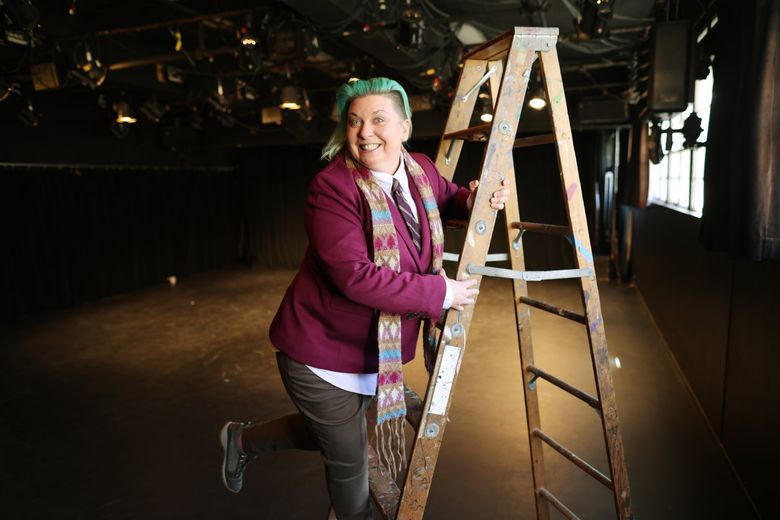Arts Spotlight
Last September, an alarming email dinged in my inbox. The message came from Crystal Yingling, a veteran theater administrator and current executive director of Theatre Puget Sound, the 27-year-old organization whose raison d’être is supporting local theaters and theater artists.
“If we make it through the end of this year,” Yingling wrote, “it will be a miracle.”
When Yingling and I checked in in December, a miracle had happened, albeit a small one: TPS would survive through the end of the year, Yingling said (largely thanks to cutting hours across the small staff, starting with herself) but only had a financial runway to survive through April 2024. That timeline was still true as of late January, but Yingling and the TPS team are throwing everything at the wall and steering hard into the organization’s value as a community resource to try and keep TPS afloat.
Making theater in 2024’s culture and economy is hard enough, and anything that makes it harder — including possibly losing TPS, with its mission “to foster and advocate for a robust and equitable theater community” — would be, in my very professionally expressed opinion, a staggering bummer.
What is Theatre Puget Sound? Among its chief functions, TPS presents The Gregory Awards, which annually (with the exception of a few COVID years) honors shows and artists in the region; its website hosts job and audition postings, show listings, and other points of peer-to-peer connection; and it runs the unified general auditions, where TPS member actors can audition for representatives from many different theaters at once.
Also, TPS’ Space 4 Arts program administers around 25,000 square feet of theater rental space in Seattle Center’s Armory building, where the organization is headquartered, including storage space, several rehearsal spaces, and three performance spaces including the Center Theatre, the current production home to Seattle Shakespeare Company and, until June 2023, Book-It Repertory Theatre.
TPS, Yingling said, relies on membership dues from individuals and member theaters to sustain operations, and membership tanked during COVID as closed theaters meant little need for auditions or awards.
Then, Book-It’s sudden closure ripped a financial hole in TPS’ already-tenuous bottom line — some $25,000 in planned revenue vanished overnight, Yingling said.
While providing affordable space rentals is an important way TPS supports local artists, those rental fees, Yingling said, haven’t kept pace with even the baseline cost of operating them, a problem exacerbated by the fact that TPS shares all rental revenue evenly with Seattle Center.
“My main goal is to try to update and reinvent this model into something that can be sustainable,” Yingling said.
As part of this new mission-driven model, three theater companies — Sound Theatre Company, Latitude Theatre and Parley Productions — have just been announced as TPS resident companies, which will guarantee TPS some rental revenue and guarantee the theater companies affordable rehearsal and performance spaces, marketing partnerships and other shared resources.
Yingling is also hopeful that a new, more favorable agreement can be reached with Seattle Center for the rental venues; if signed by April, that would buy TPS a little more time to increase revenue.
Currently, TPS has around 800 paying individual members, and some 100 member theaters of varying sizes, Yingling said, which is “nearing pre-pandemic membership numbers but not pre-pandemic revenue.” Thousands more users availed themselves of the COVID-era, pay-what-you-want membership option, Yingling said. That option is no longer available (though TPS remains committed to financial accessibility via tiered price points and scholarships for those who need them) but membership revenue is less than half of what it was in 2019 and costs have increased significantly since then.
“We’re trying to get back to the most successful years of TPS when the membership base was higher,” Yingling said. “And ensuring that we have enough value that people want to come back, that it’s useful, and that we’re helping to foster an environment of shared knowledge and resources and learning.”
Enter: TORCH, the Theater Online Resource and Community Hub, currently slated to debut in late April. (“The irony of ‘if we will make it until then’ is not lost on me,” Yingling wrote in a follow-up email. “But TORCH will remain available for membership use regardless.”)
TORCH, which will ultimately replace TPS’ current website, will include features like discussion boards, trainings and resources, job and audition listings, a searchable database of industry professionals and access to revenue- and cost-sharing opportunities such as shared concessions or staff.
So many small theaters are grappling with the same problems, Yingling said, and she hopes TPS can help them share resources for everything from marketing to hiring front-of-house staff. As Yingling put it, “One company can spend $100,000 on some lighting or five companies can spend $100,000 on some lighting, which makes more sense?”
Also on the horizon are the next unified general auditions and a subsequent design and tech fair, which all kicks off Feb. 26, giving local performers and playwrights, designers and technicians a chance to connect with theaters from around the region, and vice versa.
An arts reporter’s job can sometimes feel like that of a nature documentarian: You’re not supposed to intervene even when a wonderful creature gets ripped to shreds by an unforeseen predator. But how can (or should) the media deal with such a problem? Where does industry news become publicly interesting, and can the degradation of infrastructure (often boring, very important!) reach a newsworthy threshold before the headline reads: “RIP, TPS?”
Seattle theater won’t come crumbling down if TPS ceases to exist, sure. But strong arts ecosystems need artists at all career stages, along with rehearsal spaces where they can work, small spaces where they can experiment, midsize spaces where they can learn, and large theaters where they can make a living, as a bare minimum. The more of those artists and spaces we can support, the better.
Yingling’s hopes are high that TPS will be able to continue helping all those creatives to create, but, she said, “It doesn’t just happen magically on its own, unfortunately. It takes a lot of work and resources.”







The opinions expressed in reader comments are those of the author only and do not reflect the opinions of The Seattle Times.